
Fighting Damage & Decay With High-Quality Dental Fillings in Melbourne
Dental fillings are one of the most common treatment methods available to fight tooth decay and damage, and most adults will require a filling or two at some point. Learn more about how this simple, fast procedure can help to keep your oral health on track.
- Services
- >
- General Dentistry
- >
- Dental Fillings
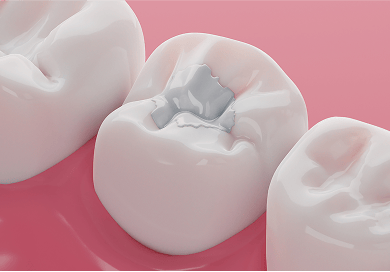
What Are Dental Fillings?
Dental fillings are a safe, simple way to fight tooth decay - and one of the most common treatments we offer here at Mulgrave Dental Group.
Fillings are used to treat decay and cavities (small holes or cracks) in your teeth, restoring function, reducing pain or sensitivity, and safeguarding against further deterioration. Unlike crowns or veneers, which sit over the top of a tooth, fillings are placed inside the crack, essentially ‘filling’ it to protect it from harm.
For your long-term well-being, it’s vital that, if you notice any signs of decay in your mouth, you speak with our team as soon as possible. These issues can become worse if left over time, so the sooner we act the sooner you can get you back on track with your oral health. Getting a dental filling is generally relaxed and painless, able to be done in one quick appointment.

Our Dental Filling Process
At Mulgrave Dental Group, we aim to make your dental filling experience as comfortable and stress-free as possible. We’ll guide you through each step, ensuring you know what to expect and addressing any questions or concerns. Here’s a quick overview of our dental filling process to help you feel prepared.
Getting a dental filling starts with a simple consultation and examination. Here, our team will evaluate the affected tooth, discuss your symptoms and recommend the ideal filling type based on your individual requirements.
At Mulgrave Dental, we’ll always prioritise your comfort. To prepare for your filling, we’ll administer local anaesthetic to numb the area around the tooth, ensuring a pain-free and relaxed procedure.
We also have a range of options available to help those with severe anxiety, including sleep dentistry, so you’ll have nothing to worry about at your appointment.
Now that you’re relaxed and ready for your treatment, we’ll carefully clean out any decayed or damaged portions of the tooth and begin placing the filling itself.
From here we can layer and shape the filling to match your tooth’s natural contours, maximising comfort and functionality.
Your dentist will employ modern dental technology to bond the filling to your tooth and cure it, giving it the strength to last. The filling will then be shaped and polished further to make final adjustments. Done!
Benefits of Dental Fillings
Dental fillings are a relatively small investment compared to other restorative dentistry treatments, making them a common and cost-effective investment in a healthier, more brilliant smile. They are a dependable solution, able to be placed with quite a quick procedure and without any serious discomfort or post-procedure pain.
Restored Functionality
Preventive Measures
Enhanced Aesthetics
Types of Dental Fillings
You have a few options when it comes to your dental filling materials, giving you a chance to pick the quality, functionality and aesthetics that suit your unique needs. So what are your choices and how do they work?
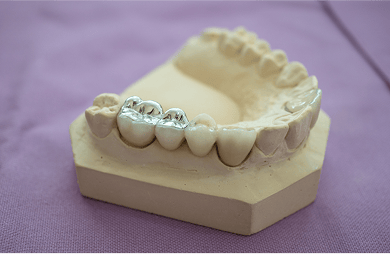
Amalgam Fillings
Made from metals like silver and mercury, amalgam fillings were once popular for their durability. At MDG, we now recommend tooth-coloured composite restorations instead - a safer, mercury-free option that looks more natural and preserves more of your tooth.
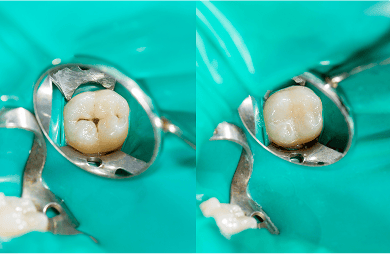
Composite Fillings
Composite fillings are a more modern option, and getting more advanced each year. They’re crafted from resin and glass, or ceramic particles, so that they can be matched to your natural teeth.
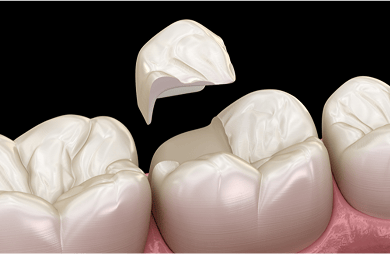
Ceramic Fillings (Inlays/Onlays)
Ceramic fillings are fashioned from high-quality dental ceramics and crafted in a dental laboratory before being bonded to your tooth. They’re known for their exceptional, natural appearance, and are highly durable.
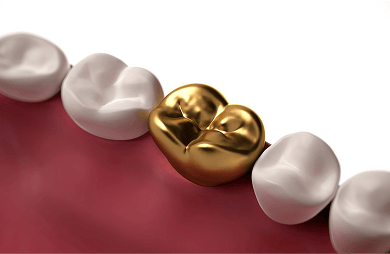
Gold Fillings
Gold fillings are crafted from a mix of gold, copper and other metals, giving them a golden hue. They’re celebrated for their remarkable durability and extended lifespan, and can be placed very easily compared to other filling types.
What Do Dental Fillings Cost?
Financing Options for Dental Fillings Treatment
We accept a variety of payment methods for dental fillings and offer a number of interest-free payment plans to help make it easy to invest in your oral wellbeing.
We offer a variety of flexible payment plans for getting dental fillings. Here you can spread out the cost of your treatment, paying in simple, manageable monthly instalments. We offer both zero- and low-interest options, depending on your budget.
Financing programs are also available at Mulgrave Dental Group, allowing you to finance the cost of dental fillings through reputable third-party financing companies. These programs often provide competitive rates and flexible repayment terms, simplifying the management of your treatment costs.
Dental insurance plans sometimes cover dental treatment, including getting fillings. If you’re not sure what your insurance will cover, chat with us during your appointment and we’ll help walk you through it.
Dental Filling FAQs
We know you might have a lot of questions about your upcoming dental appointment, which is why we’ve tried to answer some of the most common below to help you understand what getting a dental filling would look like for you.
Cavities are holes or cracks in a tooth caused by decay which can get worse over time - causing more damage. Fillings help to address cavities and prevent further damage by removing the decayed portion of the tooth and placing a protective material inside, which seals it. This process restores the tooth’s functionality and stops the cavity from growing worse.
You might need a dental filling if you experience:
- Frequent tooth sensitivity to hot, cold or sweet foods/drinks.
- Pain, discomfort or aching in a tooth.
- Dark spots, holes or pits on a tooth's surface.
- Rough or uneven tooth surfaces.
- Sensitivity when biting down or applying pressure.
- Food frequently getting stuck in a certain tooth.
No, dental filling procedures are generally not painful. This is a very minor procedure that most adults will go through once or twice in their life.
Before you get your filling, our dentists will administer local anaesthetic to numb the area, minimising any pain you might feel during the preparation of your tooth. Some patients may experience slight discomfort or sensitivity after the anaesthesia wears off, but this is usually temporary.
If you’re still worried, talk to us about our sleep dentistry and other anti-anxiety measures. We’ll take whatever steps are necessary to help you through your dental treatment and ensure you can get the best care possible for your oral health.
Dental fillings are made to last. Their lifespan can vary based on a few factors, such as the type of filling material used, your oral hygiene practices and the location of the filling. On average, we expect amalgam fillings to last around 10-15 years, while composite and ceramic fillings can last around 5-10 years.
To improve the longevity of your fillings it's essential to maintain good oral hygiene, schedule regular dental check-ups and promptly address any issues that arise. That way we can monitor the condition of your fillings during your visits and recommend replacements if needed.
Absolutely, you can typically eat and drink normally after getting a dental filling. That said, we recommend that you wait until the local anaesthesia wears off completely to avoid accidentally biting yourself!
Additionally, if your dentist used a composite filling, which can take a short time to harden completely, you may be advised to avoid eating hard or sticky foods for a few hours.
One of the best ways to look after your fillings and increase their longevity is to maintain good oral hygiene practices. We’ll give you all the tips you need to know during your appointment.
Broadly speaking, if something is good for your natural teeth, it’s probably good for your fillings too. That means brushing and flossing twice daily, moderating your sugar and acid intake, drinking plenty of water, and avoiding grinding your teeth (if you can’t stop this at night, talk to us about treatment for
bruxism).
Immediately after your appointment, things might feel a little bit different - but this feeling will usually go away quickly as your mouth adjusts.
It’s normal to experience a slight adjustment period in your bite as your mouth adapts to a new filling. While your dentist will do what they can to customise your fillings to the natural contours of your teeth, some tiny changes may occur and it’s possible you’ll feel them.
If this discomfort persists, notify us as soon as possible - we can make further adjustments and address any concerns.

Our clinic hours:
- Mon: 9 am - 6 pm
- Tue: 9 am - 7 pm
- Wed: 9 am - 7 pm
- Thu: 9 am - 7 pm
- Fri: 9 am - 5 pm
- Sat: Closed
- Sun: Closed
Any Questions?
Don’t let uncertainty put you off getting the treatment you need. We’re here to help.
At Mulgrave Dental Group, you’re our priority. We offer an array of modern dental services along with exceptional customer service in a warm, relaxed atmosphere. We have well over 50 years of collective experience, so please don’t hesitate to get in touch if you need us.
Contact us today to schedule your consultation and take the first step towards a happy, healthy smile.
Early Care for a Stronger Smile
Regular dental check-ups are key to the long-lasting health of your smile, and give your dentist a chance to see if you need any fillings early - before it’s a problem.
Mulgrave Dental Group is dedicated to preventative care and personalised treatment. Contact us today to book your appointment and keep your smile healthy for the long run.
How to Contact Us
Mulgrave Dental Group is located only 20 minutes from Melbourne CBD, just off Wellington Road. Come visit our office at 47 Wanda Street, Mulgrave, 3170 Victoria.
Call us on: 03 9562 5156
Email: reception@mulgravedentalgroup.com.au
Get proactive about your oral health - book a check-up today
Explore Alternatives to Dental Fillings
While dental fillings are a common and cost-effective way to fill cavities and prevent further problems, they aren’t suitable for treating every issue related to decay. Instead, other related restorative services may be required.
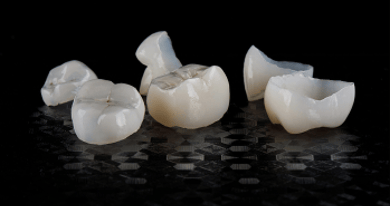
Crowns
Dental crowns, also called dental caps, are porcelain prosthetics which can be installed over your entire tooth to help protect it from further damage and ensure its longevity.

Dental Bonding
Dental bonding is ideally suited to repairing minor damage and improving the appearance of teeth without the need for more surgery. It uses a tooth-coloured composite to help reshape and restore a damaged tooth.

Root Canal Treatment
Root canal treatment can save natural teeth when tooth decay gets inside, down to the roots. It is a careful process which cleans the inside of a tooth, replacing the damaged pulp with a new, clean rubber-like material.